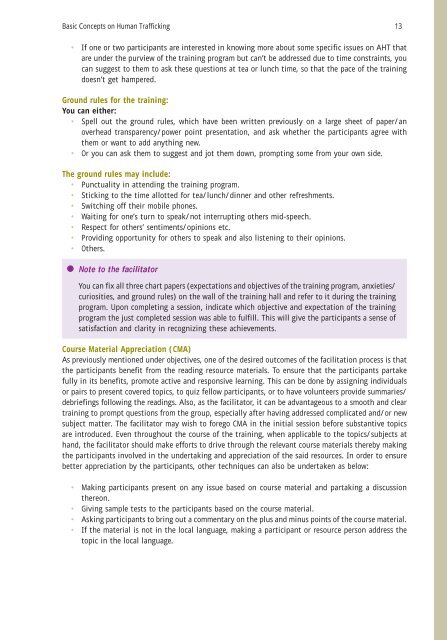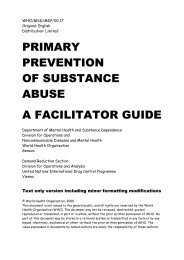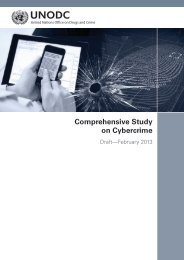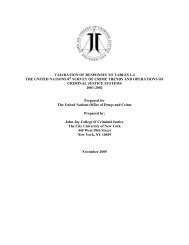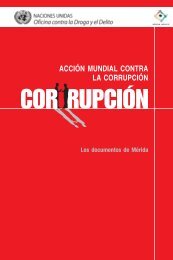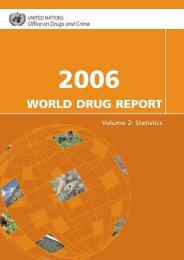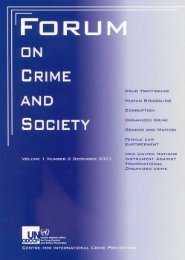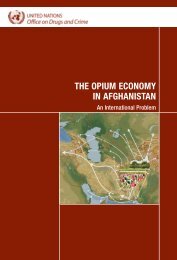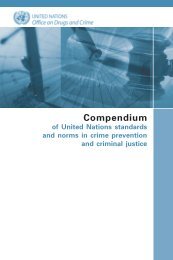Manual for Training Police on Anti Human Trafficking
Manual for Training Police on Anti Human Trafficking
Manual for Training Police on Anti Human Trafficking
You also want an ePaper? Increase the reach of your titles
YUMPU automatically turns print PDFs into web optimized ePapers that Google loves.
Basic C<strong>on</strong>cepts <strong>on</strong> <strong>Human</strong> <strong>Trafficking</strong><br />
If <strong>on</strong>e or two participants are interested in knowing more about some specific issues <strong>on</strong> AHT that<br />
are under the purview of the training program but can’t be addressed due to time c<strong>on</strong>straints, you<br />
can suggest to them to ask these questi<strong>on</strong>s at tea or lunch time, so that the pace of the training<br />
doesn’t get hampered.<br />
Ground rules <str<strong>on</strong>g>for</str<strong>on</strong>g> the training:<br />
You can either:<br />
Spell out the ground rules, which have been written previously <strong>on</strong> a large sheet of paper/an<br />
overhead transparency/power point presentati<strong>on</strong>, and ask whether the participants agree with<br />
them or want to add anything new.<br />
Or you can ask them to suggest and jot them down, prompting some from your own side.<br />
The ground rules may include:<br />
Punctuality in attending the training program.<br />
Sticking to the time allotted <str<strong>on</strong>g>for</str<strong>on</strong>g> tea/lunch/dinner and other refreshments.<br />
Switching off their mobile ph<strong>on</strong>es.<br />
Waiting <str<strong>on</strong>g>for</str<strong>on</strong>g> <strong>on</strong>e’s turn to speak/not interrupting others mid-speech.<br />
Respect <str<strong>on</strong>g>for</str<strong>on</strong>g> others’ sentiments/opini<strong>on</strong>s etc.<br />
Providing opportunity <str<strong>on</strong>g>for</str<strong>on</strong>g> others to speak and also listening to their opini<strong>on</strong>s.<br />
Others.<br />
Note to the facilitator<br />
You can fix all three chart papers (expectati<strong>on</strong>s and objectives of the training program, anxieties/<br />
curiosities, and ground rules) <strong>on</strong> the wall of the training hall and refer to it during the training<br />
program. Up<strong>on</strong> completing a sessi<strong>on</strong>, indicate which objective and expectati<strong>on</strong> of the training<br />
program the just completed sessi<strong>on</strong> was able to fulfill. This will give the participants a sense of<br />
satisfacti<strong>on</strong> and clarity in recognizing these achievements.<br />
Course Material Appreciati<strong>on</strong> (CMA)<br />
As previously menti<strong>on</strong>ed under objectives, <strong>on</strong>e of the desired outcomes of the facilitati<strong>on</strong> process is that<br />
the participants benefit from the reading resource materials. To ensure that the participants partake<br />
fully in its benefits, promote active and resp<strong>on</strong>sive learning. This can be d<strong>on</strong>e by assigning individuals<br />
or pairs to present covered topics, to quiz fellow participants, or to have volunteers provide summaries/<br />
debriefings following the readings. Also, as the facilitator, it can be advantageous to a smooth and clear<br />
training to prompt questi<strong>on</strong>s from the group, especially after having addressed complicated and/or new<br />
subject matter. The facilitator may wish to <str<strong>on</strong>g>for</str<strong>on</strong>g>ego CMA in the initial sessi<strong>on</strong> be<str<strong>on</strong>g>for</str<strong>on</strong>g>e substantive topics<br />
are introduced. Even throughout the course of the training, when applicable to the topics/subjects at<br />
hand, the facilitator should make ef<str<strong>on</strong>g>for</str<strong>on</strong>g>ts to drive through the relevant course materials thereby making<br />
the participants involved in the undertaking and appreciati<strong>on</strong> of the said resources. In order to ensure<br />
better appreciati<strong>on</strong> by the participants, other techniques can also be undertaken as below:<br />
Making participants present <strong>on</strong> any issue based <strong>on</strong> course material and partaking a discussi<strong>on</strong><br />
there<strong>on</strong>.<br />
Giving sample tests to the participants based <strong>on</strong> the course material.<br />
Asking participants to bring out a commentary <strong>on</strong> the plus and minus points of the course material.<br />
If the material is not in the local language, making a participant or resource pers<strong>on</strong> address the<br />
topic in the local language.<br />
13


